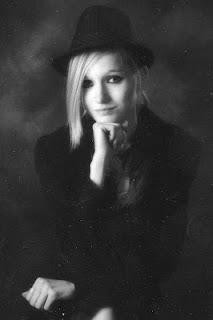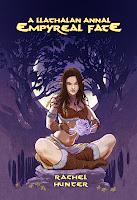
Author Rachel Hunter
Rachel Hunter is a young author with a sharp mind and an obviously active imagination. Today she’s sharing her experience as an author so far with me, and letting me in on what makes her tick.Sofia: What genre do you generally write and what drew you to this genre, Rachel?
Rachel: I generally write fantasy novels. What could be more magical than transporting oneself into realms of the impossible – the enchanting? Since I could but only grasp onto the covers of a book, I have been reading to my heart’s content. Although I enjoy works spanning all genres, I have found that fantasy beckons my attention far above all. There’s something in the nature of the fantastical that draws me in; there’s something about the feel of alternate worlds and mystical planes that ensnares me. And this is why I’ve chosen fantasy as my own genre. I want to make others feel the way I do about words: to breathe in awe at their elusive connectedness – to marvel the fluid way in which they bind. It’s this internal delight that delivers life upon a sheet of parchment. And it is this feeling I wish to instill.
Sofia: You were obviously born to be an author. What have you had published to-date?
Rachel: I have had a few poetry pieces published throughout the years, but my most recent publications include a short story about my relationship with an eating disorder, titled, “Perfect Nothing”, which is published through Trestle Press; and my fantasy novel, “Empyreal Fate”, which is published in both paperbackand ebookformats through Hydra Publications.
Sofia: I would say you’ve achieved a lot for someone who is still so young! When you’re not writing, do you read eBooks or do you prefer “regular” books?
Rachel: I much prefer print books – not only for nostalgic reasons, but also because the print versions tell stories of their own that the electronic versions can never relay. You can carry a paperback with you for years, mark your favorite passages, and keep it on a shelf to display the beautiful binding. (You can also read it while taking a bath without having to worry about spoiling an expensive reading device… though I don’t recommend dropping a book in the tub all the same). Also – what else can beat the feel of a cover between one’s fingers, the smell of new pages, and the crackle as you turn them over for the first time? Besides, the physical book has the cover art, which is so much more splendid when observed in person rather than in a small, pixelated image. Yes, print is most assuredly my preference when reading.
Sofia: I have to admit I completely agree with your sentiments about print books, Rachel. And since we’re talking about books, do you have a favorite fictitious character?
Rachel: Hmmm. I have many favourites… As for woman characters, I would say Polgara, from David Eddings’ novels, is my choice, for she is wise, strong-willed, and set in her ways. Yet she is also loving and tender when the situation calls for it.
As for male characters, I am intrigued greatly by Hannibal Lecter. Although he is a twisted figure, by far, I am fascinated by his psyche and the code he lives by. But perhaps that’s the psychologist in me. *chuckles*
Sofia: Oh yes, Hannibal Lecter is definitely a twisted character, but infinitely interesting.
You mentioned how a book cover looks better in person than on a computer screen. That being said, how important do you think book titles and covers are? And did you have a say in yours?
Rachel: I think titles and covers are extremely important – as are any aesthetic features for marketing and promotion. One often hears the saying, “Don’t judge a book by its cover,” but honestly, if someone runs across a work that is poorly or tastelessly composed in art, what are the chances it will be read when so many other covers can induce greater intrigue and excitement? The cover – and title – is the face of an author’s creation, and as with any face, it should be neat and well-displayed. But of course, tastes change in everyone. What one person finds to be an attractive cover may be disliked by another. So go with what you think is best – but don’t settle for less.
Indeed; I had a say in my cover, and I hired the brilliant Peter Bradley to do the artwork for “Empyreal Fate”. Amarya is the elf he depicted on the front, and I couldn’t be more pleased with his work.
Sofia: What are you working on at the moment?
Rachel: I’m actually working on a concept for a new steampunk novel – incorporating a Victorian flair amidst fantasy and science fiction elements. I won’t go into much detail about it yet, but I am quite excited to be researching this era and coming up with new ideas.
Sofia: Good luck! It sounds like you’re onto something highly original. Do you have time to work on these new ideas and write every day?
Rachel: Unfortunately, as a college student, my time is often limited. However, I write when I can – and mostly when the spark of the Muse is at its greatest. It doesn’t always show up when I wish it to, mind you, but then again… does it ever?
Sofia: My own Muse is rather wilful and stubborn. Along those lines - do you plot your stories or do you just get an idea and run with it?
Rachel: No; I do not outline – much, anyway. I first obtain a sense of what I wish to write about – I close my eyes and feel the characters beside me; I hear the sounds of the world in my brain – and then I just… write. The words seem to come to me. (Although, sometimes the right words are difficult to beckon). I find that if I limit myself to an outline, I am only limiting the extent to which my story may blossom. My characters are not intended to be static representations of my imagination, but rather abstract individuals with multi-dimensional facets of interests. Quirks, if you will. Even the side characters play their part. I just find that if I set my characters and their actions in stone, their developmental growth throughout the tale is stilted. Besides, my mind changes from day-to-day. Who’s to say my initial idea won’t be replaced by something more powerful the next time I sit before the monitor? No. I let the Muse guide me. Not an outline of strict ‘rules’.
Sofia: I’m not a fan of strict rules, which is why my editor and I had some “issues”. How does it make you feel when you hand your work over to an editor once you’ve completed a manuscript?
Rachel: It’s both exciting and nerve-wracking. I tend to be quite shy at first about works I produce, but the feeling doesn’t last long. Mostly, I feel as though my manuscript is a child, and it must have exposure and criticism if it is to turn out ideally.
Sofia: Do you have to do much research for your writing?
Rachel: I do research when it comes to writing about technology, portraying accurate style, dress, and language for a particular era, laying the foundations for a specific scene, etc… Mostly, I find I am having to do more research for my steampunk idea as opposed to my fantasy novel. The scientific elements in steampunk call for a heavier amount of research.
Sofia: How do you deal with rejection from publisher/agents?
Rachel: I read it, I take it in (and hope it is helpful in some way), and I move on. From there, I work to perfect my writing and see where I may improve.
Sofia: That’s a very positive way of handling it, and good advice too. What other advice would you give aspiring writers?
Rachel: Read much. Write often – and write nonsense. Jot down the first thing that comes to your mind and expand from there. Don’t think about what makes sense or which direction the flow will take you. Just allow the Muse to guide your hand. Once you have a start, you’ll know what to do. Perhaps not right away; let the words sit awhile. But make sure to come back to it, and then will you find the beauty within. The beauty of madness; the beauty of creation.
Sofia: If you could invite anyone from any era for a cup of coffee in your living room, who would you choose?
Rachel: Wow – a wonderful question indeed. I’m not sure that I could settle for a single person! There have been so many brilliant, fascinating figures throughout history. Why don’t we start with one then, and assume I can visit with the rest later? How about JRR Tolkien? He’s one of the many I would love to meet. But again – the list is endless.
Sofia: I’ll have to interrogate you again at a later date and make a dent in that list of yours.
Do you have a favorite quote?
Rachel: One of my favourites is by Anton Chevhok: “Don’t tell me the moon is shining; show me the glint of light on broken glass.”
Sofia: Show, don’t tell… where have I heard that before? And speaking of telling, can you tell me what you do when you’re not writing?
Rachel: Well, when I’m not studying or plotting my next attempt at world domination, I’m searching for various ways to expressive myself or connect with the divine. I find that nature is a great place to tune in to the Muse, so I take advantage of opportunities to bike, kayak, walk, or scale the occasional mountain. I also like to learn, so I often research the most random of subjects. But typically, one can find me reading, writing, painting, attempting to draw, whipping out the next role-playing game, doing yoga, or constructing an obnoxiously large puzzle. (I’ve recently completed and hung up an 8,000-piece puzzle of Raphael’s The School of Athens). I also want to try my hand at glass blowing, but from what I hear, great caution must be made in the endeavour.

What do you think the future holds for you as a writer?
Rachel: For my future, I see psychology, either Medical or Nursing School, and – of course – more writing. I plan to finish my Llathalan Annal series, compose more poetry, experiment with steampunk, and see where else the Muse takes me.
Sofia: Personally, I look forward to seeing where your Muse will take you.
A Llathalan Annal: Empyreal Fate – Part One by Rachel Hunter is available on Amazon and at Hydra Publications (eBook version). You can also buy it in print on Amazon.

